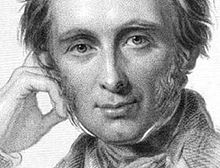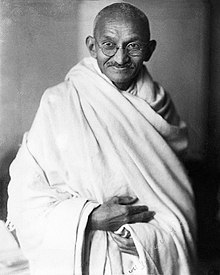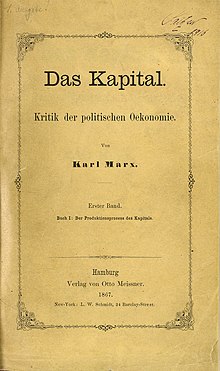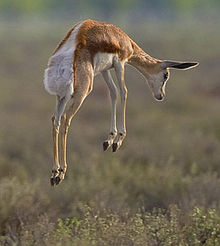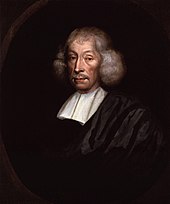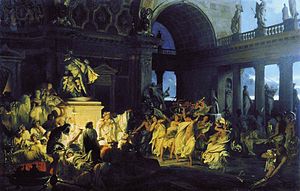Critique of political economy or critique of economy is a critique that questions the very object of the economy, and hence reject the axioms, institutions and social categories, abstractions as well as the entire paradigm of what is usually referred to as "the economy".
The critics of economy tend to agree that practices, assumptions, and concepts that are commonplace within the field of economics are unscientific. As well as claim that these phenomena are rather caused by societal and or normative practices than any self-evident laws. Therefore, critics of political economy commonly view what is most commonly referred to as "the economy" as being bundles of metaphysical concepts and societal practices. Critics of political economy do not view "the economy", or related categories, as transhistorical, but rather as relatively new in history, emerging along with capitalist modernity. Critics of political economy aim to critique the economy itself, and hence don't aim to create theories regarding how to administer economies, as done in conventional economics.
There are multiple critiques of political economy today, but what they have in common is critique of the dogma which claims "the economy" as a necessary societal category. Regarding contemporary Marxian criticisms, these are also generally accompanied by a rejection of more naturalistically influenced readings of Marx critique of political economy, as well as other readings later deemed "weltanschaaungsmarxismus" ("worldview marxism"), that was popularized as late as toward the end of the 20th century.
According to some Marxist scholars, contemporary critiques of political economy and contemporary German Ökonomiekritik have been at least partly neglected in the anglophone world.
Ruskin's critique of political economy
In the 1860s, John Ruskin published his essay Unto This Last which he came to view as his central work. The essay was originally written as a series of publications in a magazine, which ended up having to suspend the publications, due to the severe controversy the articles caused. While Ruskin is generally known as an important art critic, his study of the history of art was a component that gave him some insight into the pre-capitalist societies of the middle ages, and their social organization. Through this insight, he was able to take a different view of the concept of "the economy" as it was envisaged by the classical economists John Stuart Mill, Adam Smith and David Ricardo. Ruskin viewed "the economy" as a kind of "collective mental lapse or collective concussion", and he viewed the emphasis on precision in industry as a kind of slavery. Due to the fact that Ruskin regarded "the economy" as "mad", he said that it interested him as much as "a science of gymnastics which had as its axiom that human beings in fact didn't have skeletons". Ruskin declared that economics rests on positions that are exactly the same. According to Ruskin, these axioms resemble thinking, not that human beings do not have skeletons, but rather that they consist entirely of skeletons. Ruskin wrote that he didn't oppose the truth value of this theory, he merely wrote that he denied that it could be successfully implemented in the world in the state it was in.
Ruskin also coined the term Illth to refer to the reverse position of wealth. Ruskin is not well known today, but in 1906, a journalist asked the first generation of Labour MPs which book had most inspired them, Unto This Last emerged as an undisputed chart-topper.
[...] the art of becoming "rich," in the common sense, is not absolutely nor finally the art of accumulating much money for ourselves, but also of contriving that our neighbours shall have less. In accurate terms, it is "the art of establishing the maximum inequality in our own favour."
— Ruskin, Unto this last
Criticism of Ruskin's analysis by Marx and Engels
Marx and Engels regarded much of Ruskin's critique as rather reactionary. His idealization of the Middle Ages made them reject him as a "feudal utopian".
Marx's critique of political economy
Karl Marx is probably the most famous critic of political economy. However Marx's companion Friedrich Engels also critiqued the economy in his Outlines of a Critique of Political Economy (1844), which helped lay down some foundation for what Marx was to take further. Marx's critique of political economy encompasses the study and exposition of the mode of production and ideology of bourgeois society, and its critique of "Realabstraktionen" ["real abstraction"], that is, the fundamental "economic" and social categories present within what for Marx is the capitalist mode of production, for example abstract labour. In contrast to the classics of political economy, Marx was concerned with lifting the "ideological veil" of surface phenomena and exposing the norms, axioms, social practices, institutions and so on, that reproduced capital. The central works in Marx's critique of political economy are Grundrisse, A Contribution to the Critique of Political Economy and Das Kapital. Marx's works are often explicitly named – for example: A Contribution to the Critique of Political Economy, or Capital: A Critique of Political Economy. Marx also cited Engels' article Outlines of a Critique of Political Economy several times in Das Kapital. However Trotskyists and other Leninists tend to implicitly or explicitly argue that these works constitute and or contain "economical theories" which can be studied independently. This was also the common understanding of Marx's work on economy that was put forward by Soviet orthodoxy. Since this is the case, it remains a matter of controversy whether Marx's critique of political economy is to be understood as a critique of the political economy or, according to the orthodox interpretation another theory of economics. The critique of political economy is considered the most important and central project within what is usually referred to as "Marxism", which has led to, and continues to lead to a large number of advanced approaches within and outside academic circles.
Foundational concepts in Marx critique of political economy
- Labour and capital are historically specific forms of social relations, and labour isn't the source of all wealth.
- Labour is the other side of the same coin as capital, labour presupposes capital, and capital presupposes labour.
- Money is not in any way something transhistorical or "natural" (which goes for the other categories of the economy as well), and gains its value due to social relations rather than any inherent quality.
- The individual doesn't exist in some form of vacuum but is rather enmeshed in social relations.
Economists: religious and ahistorical thought
Marx described the view of contemporaneous economists and theologians on social phenomena as similarly unscientific.
"Economists have a singular method of procedure. There are only two kinds of institutions for them, artificial and natural. The institutions of feudalism are artificial institutions, those of the bourgeoisie are natural institutions. In this, they resemble the theologians, who likewise establish two kinds of religion. Every religion which is not theirs is an invention of men, while their own is an emanation from God. When the economists say that present-day relations – the relations of bourgeois production – are natural, they imply that these are the relations in which wealth is created and productive forces developed in conformity with the laws of nature. These relations, therefore, are themselves natural laws independent of the influence of time. They are eternal laws that must always govern society. Thus, there has been history, but there is no longer any. There has been history, since there were the institutions of feudalism, and in these institutions of feudalism we find quite different relations of production from those of bourgeois society, which the economists try to pass off as natural and as such, eternal."
— Marx: The Poverty of Philosophy
Marx continued to emphasize the ahistorical thought of the modern economists in the Grundrisse, where he critiqued Mill.
He also viewed the viewpoints which implicitly regarded the institutions of modernity to be transhistorical as fundamentally ahistorical.
Individuals producing in society, and hence the socially determined production of individuals, is, of course, the point of departure. The solitary and isolated hunter or fisherman, who serves Adam Smith and Ricardo as a starting point, is one of the unimaginative fantasies of eighteenth-century romances a la Robinson Crusoe; and despite the assertions of social historians, these by no means signify simply a reaction against over-refinement and reversion to a misconceived natural life. No more is Rousseau's contract social, which by means of a contract establishes a relationship and connection between subjects that are by nature independent, based on this kind of naturalism. This is an illusion and nothing but the aesthetic illusion of the small and big Robinsonades. It is, on the contrary, the anticipation of "bourgeois society," which began to evolve in the sixteenth century and in the eighteenth century made giant strides towards maturity. The individual in this society of free competition seems to be rid of natural ties, etc., which made him an appurtenance of a particular, limited aggregation of human beings in previous historical epochs. The prophets of the eighteenth century, on whose shoulders Adam Smith and Ricardo were still wholly standing, envisaged this 18th-century individual – a product of the dissolution of feudal society on the one hand and of the new productive forces evolved since the sixteenth century on the other – as an ideal whose existence belonged to the past. They saw this individual not as a historical result, but as the starting point of history; not as something evolving in the course of history, but posited by nature, because for them this individual was in conformity with nature, in keeping with their idea of human nature. This delusion has been characteristic of every new epoch hitherto.
— Marx, A Contribution to the Critique of Political Economy, (Introduction)
According to Jacques Rancière, what Marx understood, and what the economists failed to recognize was that the value-form isn't something essential, but merely a part of the capitalist mode of production.
On proper scientific inquiry
Marx also offered a critique regarding the idea of people being able to conduct scientific research in this domain. Or, as he stated it himself:
"In the domain of Political Economy, free scientific inquiry meets not merely the same enemies as in all other domains. The peculiar nature of the materials it deals with, summons as foes into the field of battle the most violent, mean, and malignant passions of the human breast, the Furies of private interest. The English Established Church, e.g., will more readily pardon an attack on 38 of its 39 articles than on 1/39 of its income. Nowadays atheism is culpa levis [a relatively slight sin, c.f. mortal sin], as compared with criticism of existing property relations."
— Marx: Das Kapital (Preface to the First German Edition)
On vulgar economists
Marx also used to criticize the false critique of political economy of his contemporaries. Something he did, sometimes even more forcefully, than he critiqued the classical, and hence 'vulgar' economists. He for example rejected Lasalle's 'iron and inexorable law' of wages, which he simply regarded as mere phraseology. As well as Proudhon's attempts to do what Hegel did for religion, law, etc, for political economy, as well as regarding what is social as subjective, and what was societal as merely subjective abstractions. In Marx's view, the errors of these authors led the workers' movement astray.
Interpretations of Marx's critique of political economy
Some who engage with Marx's critique of political economy affirm the critique might assume a more Kantian sense, which transforms "Marx's work into a foray concerning the imminent antinomies that lie at the heart of capitalism, where politics and economy intertwine in impossible ways." Others view Marx's critique as being a critique of commodity fetishism and the manner in which this concept expresses a criticism of modernity and its modes of socialization.
Critique of Marx's critique of political economy
The postmodern philosopher, Jean Baudrillard, has critiqued Marx's critique of political economy in his 1973 book Le Miroir de la production. He views Marx as being stuck in the very categories he wanted to critique.
Critique of political economy versus common economic criticism
One may differentiate proper critique of the political economy, which takes on a more ontological character, where authors criticise the fundamental concepts and categories which make up the economy as an entity in itself. Other authors who put forward a more common economic criticism does, from the perspective of the critics of political economy, merely critique "certain practices" in attempts to implicitly or explicitly 'rescue' the political economy by critique; these authors might for example propose universal basic income, planned economy or other interventions to "keep the economy running". Or aim to simply point out that economic theories very often don't correspond with reality at all due to assumptions which are so outlandish that they are impossible to believe in. However these movements and criticisms seldom critique the very concept of economy, but implicitly regard it as a transhistorical phenomenon. Those who proclaim themselves "Marxist economists", have been rather active in suppressing the Marxian critique of political economy during the 20th century.
List of critics of political economy
Contemporary
Sociologists
- Orlando Patterson, John Cowles professor of sociology at Harvard University is also a critic of economics, which he claims is pseudoscience.
Mathematicians
- Claus Peter Ortlieb was a german mathematician who among other engagements was a critic of political economy. He was also critical of the lacking nature of the mathematical tools used by contemporary "economists", and by scientists generally.
Historians
- The scholar Rasmus Fleischer has utilized methodology related to critique of political economy in his award-winning dissertation The political economy of music, law auditory media, and the defence of live music, 1925-2000.
Philosophers
Historical
Historians
Poets
- Carl Jonas Love Almqvist had a romantic critique of political economy.
- The Swedish poet August Strindberg also critiqued political economy.
Others
- A critic of political economy who is also was a critic of work is Paul Lafargue.[70]
